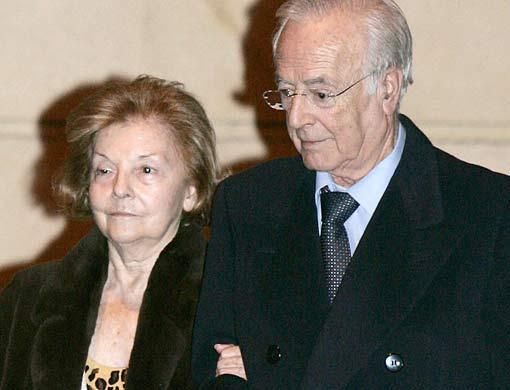Madrid: Spanish police detained Argentine ex-President Isabel Peron, who allegedly approved the shadowy right-wing death squads that ushered her nation into a bloody dictatorship, but she was later released conditionally after appearing at a court.
A judge at Spain's highest criminal court, Juan del Olmo, ordered that the 75-year-old former leader - who has refused to be extradited - be provisionally released and appear in court in two weeks, the source said.
She was arrested earlier in the day in her secluded home in the hills west of Madrid, according to police sources.
Peron, the third wife of the late Argentine president Juan Peron, is being sought by the Argentine courts over the kidnapping and disappearance of activist Hector Fagetti Gallego, who was arrested one month before the March 1976 coup that ousted her as president.
Interest in the lifestyle of Peron, who held the presidency from 1974 to 1976, has risen sharply since Thursday, when Argentine judge Hector Acosta issued an international warrant for her arrest.
Police detained her in Madrid on Friday at the request of an Argentine investigative judge, and she was taken to the National Court in Madrid. The Argentine judge's request suggests that the South American nation is finally ready to examine the origins of the state-sponsored terrorism responsible for thousands of deaths in the 1970s and 1980s.
As Peron walked free to a car awaiting her outside the National Court, a group of protesters shouted abuse at her. She did not make any comments to reporters.
Argentina has 40 days to file an extradition request, according to a court statement issued to reporters waiting outside. During that time, Peron is required to appear at a police station every 15 days, it said.
Peron married strongman Juan Domingo Peron several years after the death of his second wife, the iconic Argentine first lady Eva Peron. She became president when he died and has lived in quiet exile in Madrid in the decades since her ouster in a 1976 military coup.
Isabel Peron, now 75, had no comment as she was driven Friday from her villa in the wealthy Villanueva de la Canada neighborhood to Spain's National Court, where Judge Juan del Olmo is in charge of the case.
Since her arrival in Spain, Isabel Peron, whose real name is Maria Estela Martinez de Peron, is said to frequent a closed circle of Argentine and Spanish friends that includes relatives of late Spanish dictator Franciso Franco.
Daily newspaper El Pais said recently that her absence from public life was due to her frail health. She is thought to suffer from Graves-Basedow disease, a disorder that affects the thyroid.
Many human rights activists say Argentina's "dirty war" really began with Peron and her once-powerful inner circle, whose October 1975 decrees called on the armed forces to «annihilate» people deemed to be «subversive elements.»
Testifying as a witness in a 1997 Spanish case, she said she recalled approving the decrees but didn't remember details and was unaware of any abuses during her presidency.
While Argentina's justice system has documented thousands of cases of human rights abuses committed under the 1976-1983 dictatorship, investigative judges have generally avoided looking into atrocities that occurred before the military coup.
Federal Judge Raul Acosta, who ordered Peron's arrest, reflected this new initiative when he signaled that not even the former president was untouchable.
"I don't care one bit who she is. For me, she's just one more citizen," Acosta was quoted as telling Argentine newspaper Clarin for Friday's editions.
Specifically, he ordered Peron - whose full name is Maria Estela Martinez de Peron - held for questioning in the disappearance of 24-year-old Hector Aldo Fagetti Gallego, one month before she was ousted in the coup.
A separate probe by Federal Judge Norberto Oyarbide also focuses on the once-feared Argentine Anti-communist Alliance, a death squad blamed for at least 1,500 killings of government opponents from 1973-1976. The dead included leftists, trade activists, opposition lawmakers and intellectuals.
Some victims were abducted off the street and never again seen. Others were found dead of bullet wounds, some with their hands hacked off or charred.
The violence set the stage for the dirty war under 1976-1983 military rule, in which nearly 13,000 people are officially listed as dead or missing. Human rights groups say the total is closer to 30,000.
Peron has been leading a semi-reclusive life in Spain since 1980, according to local media, splitting her time between her house near Madrid and a home in the southern seaside resort of Marbella, a favourite haunt for the country's jetset.
But the woman who succeeded "Evita" Peron as Argentina's first lady never appears in public, avoids her neighbours' curious gaze and refuses all requests for interviews.













